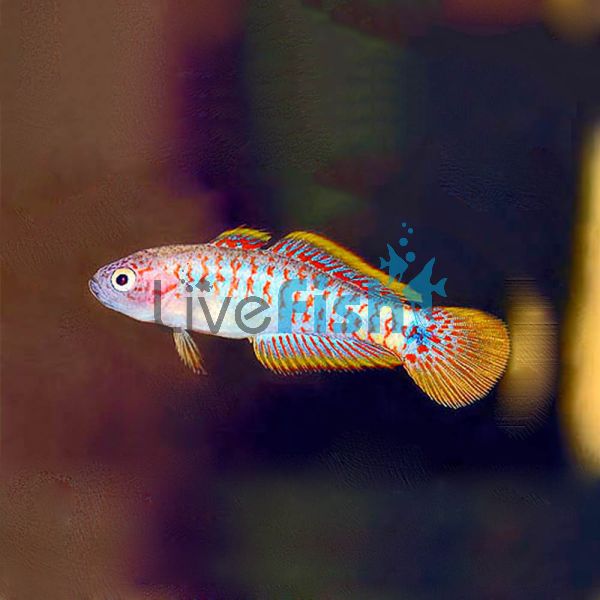Peacock Gudgeon N.G 2.5cm
Arguably one of the cutest fish in the aquarium hobby is the peacock gudgeon. The adorable personality, vibrant colours and small size often makes the peacock gudgeon a bucket list species for aquarists to keep, and rightfully so. It's quite often the case where we see the picture of a fish online that looks absolutely stunning but in person, it’s not nearly the same. The peacock gudgeon however truly looks awesome in person and when they are kept in a small group, they are incredibly eye-catching.
- Buy 5 for $21.58 each and save 10%
- Buy 10 for $19.18 each and save 20%
Peacock Gudgeon
Arguably one of the cutest fish in the aquarium hobby is the peacock gudgeon. The adorable personality, vibrant colours and small size often makes the peacock gudgeon a bucket list species for aquarists to keep, and rightfully so. It's quite often the case where we see the picture of a fish online that looks absolutely stunning but in person, it’s not nearly the same. The peacock gudgeon however truly looks awesome in person and when they are kept in a small group, they are incredibly eye-catching.
Peacock gudgeons honestly just look too good to be true. It's almost like they were a creation of imagination because their colouration is so vibrant that it's hard to imagine this fish naturally existing in the wild, however, these fish do originate from Papua New Guinea which seems to be a hotspot for vibrant coloured fish. The peacock gudgeon has the classic elongated gudgeon body shape with nearly symmetrical dorsal and ventral fins. They have a beautiful sky-blue body colour with vibrant red striping from head to tail. The simple contrast of the blue and red already makes this fish a stunner but all through the fins, there’s a bright sulphuric yellow colour as well. Though there are only three main colours, they are all so vastly different that the fish alone is so contrasting that little effort needs to be taken with the escape to highlight the fish.
Breeding peacock gudgeon makes for a fun project in the home aquarium. Best success is achieved when there is a dedicated breeding system for the fish and this is quite easy to achieve. Males tend to be larger in size than females and also develop a visible nuchal hump. They lure females into a cave to lay eggs and then guard the eggs until they hatch. After about 2 days the male stops showing parental care from which the fry can be removed and grown in a separate system.
Tank Recommendations for your Peacock Gudgeon
Peacock gudgeons are often called the ultimate nano fish because they only reach around 7cm and are perfect for small aquariums. A small group of 4 - 5 can easily be kept in a tank of 40 liters which is why these fish are so popular. The setting of the aquarium is not a major consideration however peacock gudgeons spend the vast majority of their time near the bottom aquarium. The ideal aquascape would consist of a sandy substrate, with some plants and a few caves which could be made from rock, pots, or even coconut shells. Peacock gudgeons are tropical fish that are best kept at 24-26 degrees.
Suitable Tank Buddies
Due to their extremely peaceful behavior, peacock gudgeons are great to include in community aquariums with other similar-sized and tempered fish.
Usually Compatible
Khuli loach, pygmy corydoras, maculata rasboras, neon tetras, clown panchax, and other true nano fish.
Sometimes Compatible
Apistogramma, checkerboard cichlids, angelfish, and other large and potentially aggressive species.
Rarely Compatible
Larger South American cichlids both aggressive and peaceful can easily outcompete the delicate peacock gudgeon.
Feeding your Peacock Gudgeon
Peacock Gudgeon is very easy to feed. They take to a wide range of aquarium foods such as flakes, pellets, and frozen foods. Due to their small mouths, a small slow sinking food is best with the supplementation of frozen bloodworms or brine shrimp.
| Scientific Name | Tateurndina Ocellicauda |
|---|---|
| Care Level | Easy |
| Common Names | Peacock gudgeon |
| Diet | Carnivore |
| Fish Family | Eleotridae |
| Lifespan (years) | 5 |
| Max. Length (cm) | 7 |
| Min. Tank Volume (l) | 40 Liters |
| Origin | Papua New Guinea |
| Reef Safe | Yes |
| Sociability | Peaceful |
| Venomous | No |
| Water Conditions | 24-26° C, pH 6.5 - 7.7 |




